The OP is trolling, again. I'm not playing.
You are using an out of date browser. It may not display this or other websites correctly.
You should upgrade or use an alternative browser.
You should upgrade or use an alternative browser.
What Makes Someone a Marine Scientist?
- Thread starter NW Dive Dawg
- Start date
Please register or login
Welcome to ScubaBoard, the world's largest scuba diving community. Registration is not required to read the forums, but we encourage you to join. Joining has its benefits and enables you to participate in the discussions.
Benefits of registering include
- Ability to post and comment on topics and discussions.
- A Free photo gallery to share your dive photos with the world.
- You can make this box go away
Once again...... I was just curious as to the definition of a scientist so I simply Googled "definition of a scientist" and what came up on top was exactly as follows: .....
"a person who is studying or has expert knowledge of one or more of the natural or physical sciences."
This is not MY definition. It's Oxford's definition. Maybe the folks at Oxford are idiots. Or maybe Google is just lying about this even coming from Oxford. Who knows.
I don't agree with the definition and was surprised to read it.......and then after reading it I thought it was an interesting and fun enough observation to post here.......since many divers actually do study or have studied the physics and physiology of diving.
How is that trolling.... ?
"a person who is studying or has expert knowledge of one or more of the natural or physical sciences."
This is not MY definition. It's Oxford's definition. Maybe the folks at Oxford are idiots. Or maybe Google is just lying about this even coming from Oxford. Who knows.
I don't agree with the definition and was surprised to read it.......and then after reading it I thought it was an interesting and fun enough observation to post here.......since many divers actually do study or have studied the physics and physiology of diving.
How is that trolling.... ?
SlugLife
Contributor
PhD candidate or better in some field like marine biology, oceanography, etc.
PHD has nothing to do with science, or being a scientist. It is merely references education you may have received.So I would relax this requirement, many top-level scientists never got a PhD, and still impacted significantly on science and even won a Nobel prize.
When someone says "I am a baker" or "I am a software developer" or "I am a plumber." what does the "I am a ____" phrase refer to? It refers to someone who regularly does a thing proficiently.
For example:
- Person-1 is self-taught, and creates/writes/produced/records new music all the time.
- Person-2 has 2 PHDs in music and musical theory, but they haven't created, produce, written, or played music in years .... unless singing pop-songs in the shower counts.
"Being a scientists" is about DOING science.
If education is a pre-requisite for getting the title, well, I guess I've somehow managed to work over a decade professionally in fields where I don't have a degree and am largely self-taught. I'd like to think my coworkers thought I did a good job, but maybe those glowing references were because they wanted me out the door and causing trouble at some other employer.
GiraffeMarineSalvage
Contributor
You mean a Facebook-search "scientist" doesn't count? What about being a seeker of only the facts that support one's beliefs (or perhaps those of the grant funders...I am everything on your list besides CCR. My partner is actually a marine scientist (marine biology researcher) while I hold a bachelor of Science. I can say with 100% confidence I am not even close to being a marine scientist.
Regarding your definition, I fully disagree. One must have, at the very least, a understanding of the scientific method to be considered a scientist.
P.S. I'm a diver with an environmental science degree, but personally I wouldn't describe myself as a "marine scientist" despite having had courses on that subject unless I were actively/recently conducting marine research...
Let me put a bit different "take" on this thread, and what it means to be a scientist. In 1984 I made two dives in the North Umpqua River, which was convenient as it was only 10 minutes from my home at the time in Roseburg, Oregon. I had my Nikonos II camera, set up for macro photography with my Subsea 150 strobe unit. I started at the head of Winchester Reservoir, and would be underwater taking macro photos of the aquatic life. Well, I had a surprise; as I descended I noted that the mussels were secreting a white substance. I took a whole roll of film (Kodacolor color negative film), then drifted downstream to exit. The next week I went again and repeated this dive, and got another 36 exposures of these mussels spawning.
Well, since 1984 I have at times tried to excite others about these unique photos, which I have not seen published either in the regular press or in technical/scientific papers about these Western Pearlshell Mussels. I finally contacted the Xerces Society here in Portland, and got a reply from, Emilie Blevins, Senior Conservation Biologist, Endangered Species Program of the Xerces Society. She informed me that there will be a 13th BIENNAL FMCS SYMPOSIUM of the Freshwater Mussel Conservation Society, which I had never heard of before. So I sent in an abstract for a 15 minute talk about my unique photos; it was rejected. I had made several mistakes in my abstract, and I wasn't an active scientist in this field. I had decided not to switch formats to a platform poster or a 5-minute presentation.
Myself and the scientist who was in charge of the presentations had a number of discussions, and I felt that my information was worth 15 minutes. But she was insistent that I would not be approved for a talk. After a lot of e-mails back and forth, during which I talked about the fact that a person doesn't need a Ph.D. behind his/her name to make contributions to the science of mussels reproduction, I decided to do a poster and not a talk. I put together a poster with just four of my spawning photos, but also photos of possible fish other than salmonids that could be potential hosts to these Western Pearlshell Mussels. It is pretty much accepted that it is salmonids that do serve as the hosts of the glochidia (immature mussel which must attach to either gills or fins of a fish to develop), but I have noted that my observations are that salmonids are very infrequently in the area where these releases occurred. Other fish, the redside shiner, the Umpqua Northern Pike Minnow, and the Largescale sucker seemed more likely host fish, along with the salmonids in the area. Well, we'll see.
Now, all of these are photographic observations, and not scientific analyses. I therefore call myself an underwater natuaralist, and not an underwater scientist. Now, if I were an underwater scientist, I would have tried to capture the conglutinate release in a bottle, looked at it under a dissecting scope, and perhaps tried introducing it to a few different fishes to see whether they continued to develop in an aquarium. But at the time, I was a safety and health consultant in workers' compensation insurance, as a full-time job, and had two sons in school, on the swim team, in band, in boy scouts, and in piano practices. There was simply no time to do this type of research, and I had no aquarium to work with. We moved into a large house, and I had a shed built (the "Other Side") which eventually could have accommodated a lab with aquariums (we at that time had river water pumped up to the house, and this was my retirement dream). But I lost that job, and had to relocate to the Beaverton, Oregon area. So in order now, in my retirement, to become an aquatic scientist, I would need to either associate myself with a college lab, or set up my own lab with aquarium, dissecting scope, microscope, and digital photographic equipment in order to do more research on mussels (which still is a possibility, although I'm getting older all the time and enjoying retirement).
So I'll continue in the role of underwater naturalist, and probably not become an underwater scientist. There are local mussel beds to investigate, but I haven't seen this phenomena since that magic week in 1985. Apparently, Emilie Blevins has seen this in the wild, but it happened so quickly that she didn't get good photos of it. I have a good poster designed, which the Patty Morrison, Program Committee for FMCS stated was "visually stunning," may accomplish all that I had hoped to do with a presentation.
I hope this gives you an example though of the difference between an actual aquatic scientist and an underwater naturalist. I also have my Master of Science Degree in Public Health (MSPH), emphasis in Industrial Hygiene, and this is an actual science. I have in the workplace taken measurements of hazards, including ionizing radiation, noise, chemicals (hydrogen fluoride, sulfuric acid, etc.) using calibrated instrumentation. A casual observer could say that there was a cloud of some sort of hazardous substance, but the industrial hygienist would use instruments to determine exactly what the substance was, what the concentration was, and whether it was hazardous (over the OEL, or occupational exposure limit). This is the science of industrial hygiene and occupational health. Scientists quantify things, whereas a naturalist simply documents the observations he or she makes.
SeaRat
Well, since 1984 I have at times tried to excite others about these unique photos, which I have not seen published either in the regular press or in technical/scientific papers about these Western Pearlshell Mussels. I finally contacted the Xerces Society here in Portland, and got a reply from, Emilie Blevins, Senior Conservation Biologist, Endangered Species Program of the Xerces Society. She informed me that there will be a 13th BIENNAL FMCS SYMPOSIUM of the Freshwater Mussel Conservation Society, which I had never heard of before. So I sent in an abstract for a 15 minute talk about my unique photos; it was rejected. I had made several mistakes in my abstract, and I wasn't an active scientist in this field. I had decided not to switch formats to a platform poster or a 5-minute presentation.
Myself and the scientist who was in charge of the presentations had a number of discussions, and I felt that my information was worth 15 minutes. But she was insistent that I would not be approved for a talk. After a lot of e-mails back and forth, during which I talked about the fact that a person doesn't need a Ph.D. behind his/her name to make contributions to the science of mussels reproduction, I decided to do a poster and not a talk. I put together a poster with just four of my spawning photos, but also photos of possible fish other than salmonids that could be potential hosts to these Western Pearlshell Mussels. It is pretty much accepted that it is salmonids that do serve as the hosts of the glochidia (immature mussel which must attach to either gills or fins of a fish to develop), but I have noted that my observations are that salmonids are very infrequently in the area where these releases occurred. Other fish, the redside shiner, the Umpqua Northern Pike Minnow, and the Largescale sucker seemed more likely host fish, along with the salmonids in the area. Well, we'll see.
Now, all of these are photographic observations, and not scientific analyses. I therefore call myself an underwater natuaralist, and not an underwater scientist. Now, if I were an underwater scientist, I would have tried to capture the conglutinate release in a bottle, looked at it under a dissecting scope, and perhaps tried introducing it to a few different fishes to see whether they continued to develop in an aquarium. But at the time, I was a safety and health consultant in workers' compensation insurance, as a full-time job, and had two sons in school, on the swim team, in band, in boy scouts, and in piano practices. There was simply no time to do this type of research, and I had no aquarium to work with. We moved into a large house, and I had a shed built (the "Other Side") which eventually could have accommodated a lab with aquariums (we at that time had river water pumped up to the house, and this was my retirement dream). But I lost that job, and had to relocate to the Beaverton, Oregon area. So in order now, in my retirement, to become an aquatic scientist, I would need to either associate myself with a college lab, or set up my own lab with aquarium, dissecting scope, microscope, and digital photographic equipment in order to do more research on mussels (which still is a possibility, although I'm getting older all the time and enjoying retirement).
So I'll continue in the role of underwater naturalist, and probably not become an underwater scientist. There are local mussel beds to investigate, but I haven't seen this phenomena since that magic week in 1985. Apparently, Emilie Blevins has seen this in the wild, but it happened so quickly that she didn't get good photos of it. I have a good poster designed, which the Patty Morrison, Program Committee for FMCS stated was "visually stunning," may accomplish all that I had hoped to do with a presentation.
I hope this gives you an example though of the difference between an actual aquatic scientist and an underwater naturalist. I also have my Master of Science Degree in Public Health (MSPH), emphasis in Industrial Hygiene, and this is an actual science. I have in the workplace taken measurements of hazards, including ionizing radiation, noise, chemicals (hydrogen fluoride, sulfuric acid, etc.) using calibrated instrumentation. A casual observer could say that there was a cloud of some sort of hazardous substance, but the industrial hygienist would use instruments to determine exactly what the substance was, what the concentration was, and whether it was hazardous (over the OEL, or occupational exposure limit). This is the science of industrial hygiene and occupational health. Scientists quantify things, whereas a naturalist simply documents the observations he or she makes.
SeaRat
Attachments
-
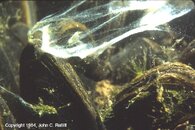 Mussels spawning.jpg89.4 KB · Views: 47
Mussels spawning.jpg89.4 KB · Views: 47 -
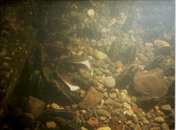 Mussels in gravel.jpg103.9 KB · Views: 42
Mussels in gravel.jpg103.9 KB · Views: 42 -
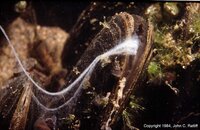 Mussels spawning7.jpg92.7 KB · Views: 44
Mussels spawning7.jpg92.7 KB · Views: 44 -
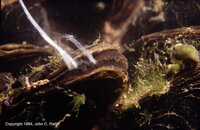 Mussels spawning8a.jpg101.9 KB · Views: 40
Mussels spawning8a.jpg101.9 KB · Views: 40 -
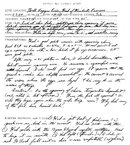 Dive Log 6-3-84.jpg159.9 KB · Views: 50
Dive Log 6-3-84.jpg159.9 KB · Views: 50 -
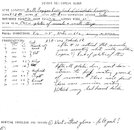 Dive Log 5-28-84.jpg114.2 KB · Views: 49
Dive Log 5-28-84.jpg114.2 KB · Views: 49 -
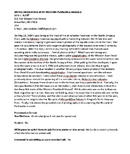 Screen Shot 2023-02-11 at 7.13.52 PM.png353.3 KB · Views: 46
Screen Shot 2023-02-11 at 7.13.52 PM.png353.3 KB · Views: 46 -
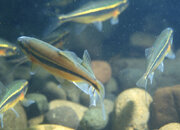 Redside shiner closeup1.jpg81.3 KB · Views: 38
Redside shiner closeup1.jpg81.3 KB · Views: 38 -
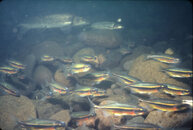 Shners NPM and largescale sucker.jpg83.9 KB · Views: 43
Shners NPM and largescale sucker.jpg83.9 KB · Views: 43 -
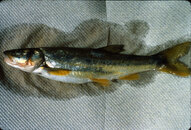 Umpqua Northern Pike Minnow1.jpg158.6 KB · Views: 41
Umpqua Northern Pike Minnow1.jpg158.6 KB · Views: 41
OTF
Coney Island Whitefish Biologist
^ excellent post
When we get to closure, can we take up "who is an engineer" next?
GiraffeMarineSalvage
Contributor
SeaRat in my book paying objective attention to, documenting, and then going out of your way to share your observations gets you precariously close to "conducting marine research" I referenced in my earlier post to the point of earning the coveted title of Marine Scientist ;-)
schuylerclark
Contributor
Coming soon: PADI Marine Scientist C-card for 3 hrs E-learning and just 2 checkout dives! (and $375, of course)
GiraffeMarineSalvage
Contributor
Checkout dives require paying instructors, probably pure PADI e-learning for $375+...Coming soon: PADI Marine Scientist C-card for 3 hrs E-learning and just 2 checkout dives! (and $375, of course)
Similar threads
- Replies
- 4
- Views
- 1,073
- Replies
- 1
- Views
- 396
Question
SCUBA, the self-policing industry
- Replies
- 85
- Views
- 3,872
- Replies
- 6
- Views
- 208




